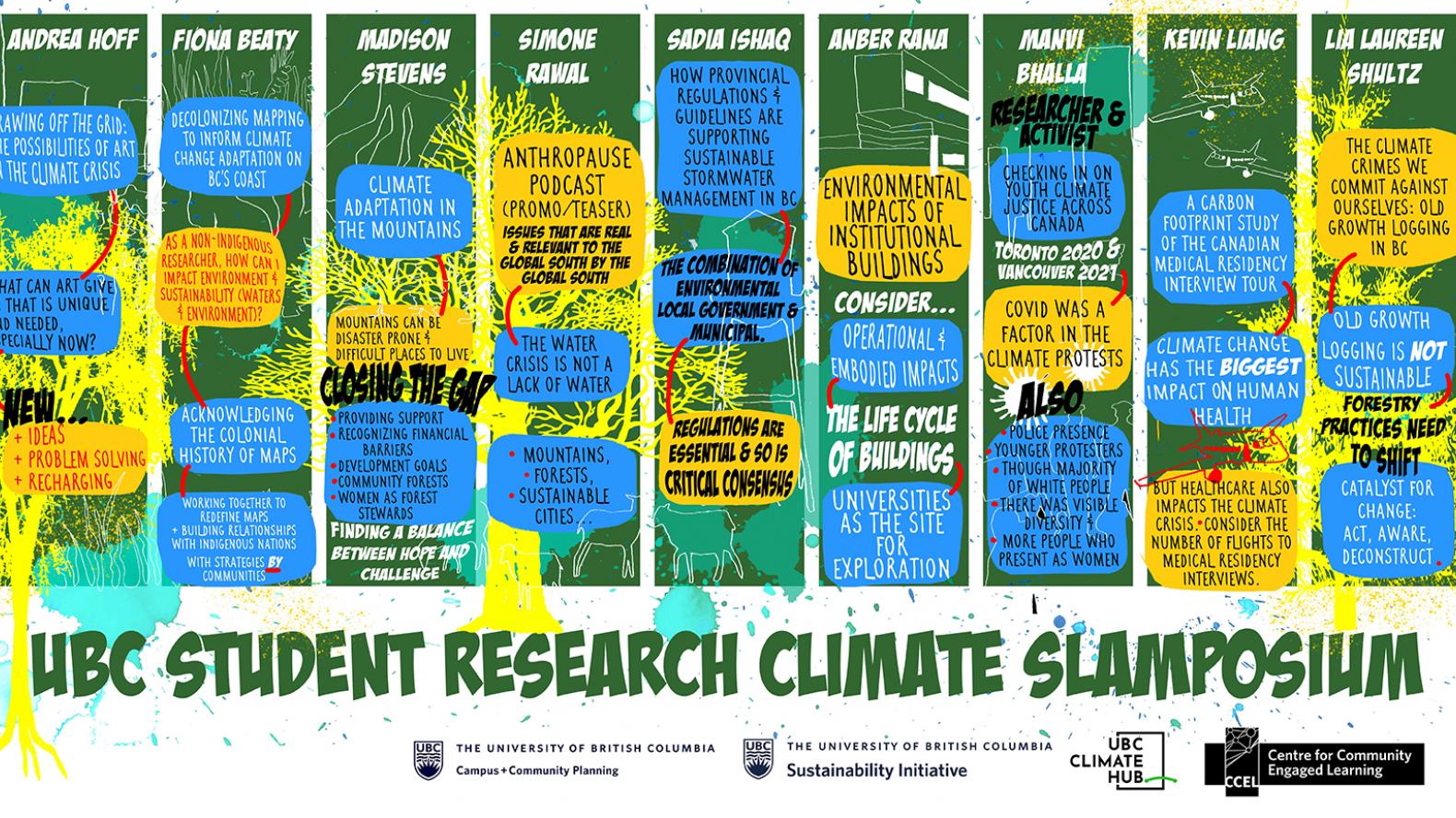
What do you get when you mix a lineup of informative presentations with creative, energy-driven flare? A Slamposium.
UBC’s first ever Student Research Climate Slamposium was initiated and led by the UBC Sustainability Initiative and Climate Hub @ UBC, in partnership with UBC Campus and Community Planning and UBC Center for Community Engaged Learning on October 15, 2021, following a two-day faculty-focused Climate Research Symposium. The event was a venue for student researchers across UBC disciplines to creatively raise awareness and share knowledge on topics spanning the UBC Climate Emergency strategic priorities.
With more than 80 attendees joining, nine UBC students from a mix of PhD, Masters, and Undergraduate programs gave engaging five-minute presentations covering the span of a number of different disciplines.
Presentations
The first set kicked off with Andrea Hoff, PhD student in Language & Literacy Education, leading attendees through an immersive draw-along exercise to ground everyone in the importance of self and community care. Andrea’s artistic and creative juices didn't end with her presentation; as the graphic recorder for the event, she interpreted the presentations through her live artistic creation, using recycled newsprint paper and card stock with ink pens and Beam watercolour paints. (Anong Beam is an artist and curator from M’Chigeeng First Nation on Manitoulin Island/Mnidoo Mnising.)
Fiona Beaty, PhD student in Zoology, followed with a colourful pecha kucha presentation examining her positionality in relation to climate change adaptation in the Salish Sea and advancing the equitable creation of knowledge, in particular, the decolonization of research approaches with Indigenous knowledge-holders and communities. From the oceans to the mountaintops, Madison Stevens, PhD student in the Institute for Resources, Environment and Sustainability (IRES), followed with a glance into community-driven, nature-based adaptation efforts in the Indian Himalayas. Further representing this part of the globe, Simone Rawal, Masters student in IRES, who is from Nepal, shared a video teaser to a podcast she created with her co-presenter Sitashma Thapa, Anthropause. The podcast “aims to share perspectives, experiences, and stories from the Global South about the climate crisis”, in particular those from South Asia in Season 1.
The second set began with informative engineering connections to the climate crisis from Sadia Ishaq, PhD student in Environmental Engineering, and Anber Rana, PhD student in Civil Engineering. Sadia focused on BC regulations and guidelines to incorporate green solutions in stormwater management, while Anber honed in on her research regarding carbon emissions from buildings at UBC, with a focus on embodied carbon. Manvi Bhalla, PhD student in IRES, then gave a timely view into an auto-ethnography of youth climate strikes in Canada, including the most recent strike in Vancouver. Adding to the interdisciplinary nature of the event, Kevin Liang, a family medicine resident, spoke about merging his student activism with actionable research and change in his own field: advocating for reducing the carbon footprint of medical residency interview tours. Rounding out the speakers list, Lia Laureen Schulz, undergraduate student in UBC-Sciences Po Dual Degree program, highlighted her activist research on the ongoing protests against old-growth logging on Vancouver Island and BC.
Discussion
We are grateful for the knowledge shared by all of the speakers and to all of those who came to listen, as well as engage in the post-presentation discussions. A wide range of community members joined breakout rooms themed on five strategic priorities from the Climate Emergency Task Force report. Participants shared their impressions of the presentations they just saw and heard, and how particular aspects of UBC’s Climate Emergency would have an impact in their own work and lives.
Highlighting students and amplifying their research will continue to be a priority for the Climate Emergency, and we welcome any input or ideas you have: climate.emergency@ubc.ca.